|
New York City’s Street Vendor Awards
|
|
The annual Vendy Awards celebrate the grit and grub of New York City’s culinary warriors
|
|
By Erica Lee Nelson Photographs by Sebastian John
|
| |
Cars honk. Rain falls. Health officials pay surprise visits. Still, they keep on serving up hot, delicious food at prices that everyone who works in the nearby skyscraper office buildings—from janitors to managers—can afford.
These are New York City’s culinary warriors, the famed street vendors who often start their days at 4 a.m. in order to serve the lunchtime hordes.
Street vendors are sometimes looked down upon as serving cheap, unsanitary food. Yet, in the United States, the profession is beginning to gain respect from celebrity chefs, the national press, advocacy organizations and everyday people looking for healthy, fast food that fits their budgets.
Street food is celebrated with special events in San Francisco and Los Angeles in California, but the New York City Vendy Awards are arguably the best-known; the Oscars of street food. The fifth annual Vendy competition took place on September 26, 2009 in Flushing Meadows Park, the site of the 1964 World’s Fair. |
| |
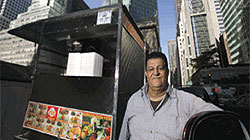
|
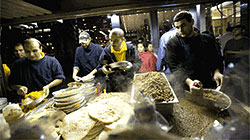 |
| Balwant Singh, owner of an Indian food cart in New York City. |
The staff at the 53rd and 6th halal cart prepare to serve customers. |
|
|
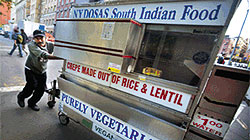 |
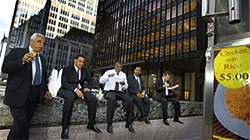 |
| Thiru Kumar, also known as the Dosa Man, wheels his food cart in Washington Square. |
Sayeed Khorsheed (from left), Amad
Ismail, Garry Jendy, Patrick Almaliki and Ruben Villaviceinco have lunch at Rafiqi’s at 52nd and Park Avenue in New York City. |
|
|
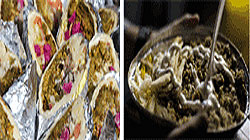 |
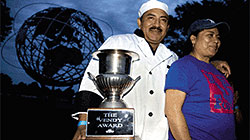 |
| Falafel sandwiches made by Freddy
Zeidaies; the rice and meat platter at 53rd and 6th halal cart in New York City. |
Fernando and Jolanda Martinez of Country Boys/Martinez Taco Truck with their 2009 Vendy Awards trophy |
|
|
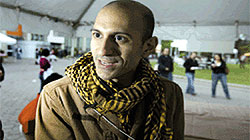 |
|
| Jehangir Mehta, judge at the Vendy Awards |
|
|
| |
South Asian vendors have been regular finalists for the awards and have once taken home the top prize. Thiru “Dosa Man” Kumar from
Jaffna, Sri Lanka, won the 2007 Vendy Award. Bangladeshi chef Meru Sikder’s Biryani Cart took the People’s Choice Award (considered by some to be the most important prize) in 2008.
South Asian vendors have been regular finalists and have once taken home the top prize.
Beyond the Biryani Cart’s second try at the award, South Asian flavors dominated in some totally unexpected food offerings this year. An ice cream cart offered toasted, curried coconut as a topping, and another vendor handed out curry and apple flavored cookies.
The event not only offers great exposure for the vendors, but serves as a fundraiser for the Street Vendor Project, affiliated with the international movement
StreetNet, headquartered in South Africa. India’s own branch, the
Patna, Bihar-based National Alliance of Street Vendors of India, is also part of the network.
These organizations work as street vendor advocates with local governments in order to make legal processes, such as the distribution of permits, work more effectively. Plus, since many vendors in the United States are immigrants, they often need help navigating the legal requirements needed to set up shop on the city streets. That’s where the project’s founder, Sean
Basinski, comes in. |
| |
| The 2009 Vendy Awards Finalists |
Meru Sikder, Biryani Cart
Specialty: Kathi rolls |
Freddy Zeidaies, King of Falafel
Specialty: Chicken gyro platter with pickled turnips |
Kenny Lao, Rickshaw Truck
Specialty: Dumplings |
O’Neill Reid, The Jamaican Dutchy
Specialty: Jerk chicken (a Jamaican marinade of herbs and spices) |
Fernando and Jolanda Martinez, Country Boys/Martinez Taco Truck
Specialty: Huarache
(a Mexican dish with a fried cornmeal base, topped with meat, salsa, etc.) |
| Other award categories include the 2009 Rookie of the Year (for vendors in business for less than a year) and Desserts. |
|
| |
“Every day (we) go out on the streets to talk to vendors,” he says. “We go to court to fight for their rights, and we organize meetings where vendors can fight for their own rights.”
Basinski used to run a burrito cart before he went to law school. That experience laid the foundation for what has become his life’s work.
“I never did it with the intention that we would be here today,” he says. “I just wanted to make a few bucks and I liked the idea of being my own boss.”
That same allure is what drove 2009 finalist Sikder to open up his own cart. After coming to the United States in 1993 and working as a banquet chef in a hotel for many years, Sikder says he always dreamed of opening his own restaurant in New York City. The start-up costs were too high, though, so he started to think about alternatives. He’s had the cart for seven years now, and has never looked back.
Since winning the People’s Choice Award in 2008, he says his business increased 40 percent. He already owns another cart right next to his original, and is planning to expand further next year.
“It’s the land of opportunity in America. My first job was pumping gas!” he says with a smile.
Of course, there are many successful vending businesses that don’t make it to the awards.
Balwant Singh, an immigrant from Phagwara, Punjab, has been running a successful Indian food cart on Park Avenue in Manhattan, New York City for the past six years. A full meal is cheap even for street food—just $5.
He holds an official permit for his location and doesn’t move around, which makes his daily business easier. “In India, the police often chase you,” he says. “Here, there is no hassle. I have an I.D. and I can park in peace.”
As to the spice factor, Singh reports that he keeps it moderate to please the general American palate, but adds, “I keep extra chilies for Indians.”
Americans are becoming much more comfortable with the hygiene levels of street vendors, especially in light of the strict health inspections they are subject to.
Hilary Sadoo, a long-time New York resident, doesn’t mind the spice at all. She frequents Sammy’s Halal cart, which, after winning the 2006 Vendy Award, has been able to expand to multiple locations across the city.
Sadoo believes that Americans are becoming much more comfortable with the hygiene levels of street vendors, especially in light of the strict health inspections they are subject to.
“The fear is subsiding I think,” she says. “The food is probably actually fresher than a restaurant because it’s all out in the open and there’s a high turnover85. My mother came here from Minnesota, and was terrified of street food until I gave her some. And then she said, ‘I could eat this every day.’ ”
Jehangir Mehta, one of the award judges, is a chef originally from Mumbai who has become a celebrity in the United States, thanks to his appearance on the TV show Iron Chef. He loves street food, but is careful to eat only at select outlets in India because of hygiene. Mostly, he says, eating well and staying healthy is a matter of what your body is accustomed to.
Mehta was also impressed that small, immigrant-run businesses were receiving so much attention.
“People are looking beyond where this man came from85. They are looking to what that person can do. It’s so nice to see we are living in a culture like that.”
Illustrating the sheer popular appeal of his spicy, juicy kathi rolls, Sikder took home the People’s Choice Award for the second year in a row. But the top prize went to Fernando and Jolanda Martinez’s Country Boys cart, which specializes in traditional Mexican food.
Fernando, an immigrant who struggled to speak English, thanked the crowd while a band played, cameras flashed and TV reporters thrust microphones toward him. “We are so happy to know that people love our food,” he said. |
|
—Courtesy SPAN |
| |
|
|
|
February 2011
|
|


|
|
|
|